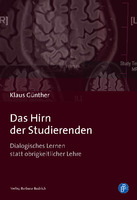Das Hirn der Studierenden
Dialogisches Lernen statt obrigkeitlicher Lehre
Abstract
A wide range of initiatives are aimed at the "sovereign teaching" that dominates universities and their lecture-oriented learning formats. Dissatisfied with low learning yield, dialogically designed learning processes are demanded. Klaus Günther's neurobiological perspective shows what is missing from the official learning constellation and what is possible in the dialogical learning constellation: teachers and learners meet in close communication and empathic proximity. Emotional pushing forces are generated in the learner's brain, on which the transfer of learning inputs depends on short-term memory to long-term memory. This is the only way to achieve a high learning yield - even when using digital media. Gegen die an Hochschulen dominante „obrigkeitliche Lehre“ und ihre vorlesungsorientierten Lernformate richten sich vielfältige Initiativen. Unzufrieden mit geringem Lernertrag werden dialogisch angelegte Lernprozesse eingefordert. In der neurobiologischenn Perspektive von Klaus Günther zeigt sich, was der obrigkeitlichen Lern-Konstellation fehlt und was in der dialogischen Lern-Konstellation möglich wird: Es treffen sich Lehrpersonen und Lernende in Nah-Kommunikation und empathischer Nähe. Im Gehirn der Lernenden werden emotionale Schubkräfte erzeugt, von denen die Übertragung der Lerninputs vom Kurzzeitgedächtnis zum Langzeitgedächtnis abhängt. Nur so entsteht – auch unter Einsatz digitaler Medien – ein hoher Lernertrag.
Keywords
Students; brainDOI
10.2307/j.ctvbkk2k8ISBN
9783847422068OCN
1135847589Publisher
Verlag Barbara BudrichPublisher website
https://budrich.eu/Publication date and place
Leverkusen-Opladen, 2019Imprint
Budrich UniPressClassification
Higher education, tertiary education


 Download
Download Web Shop
Web Shop